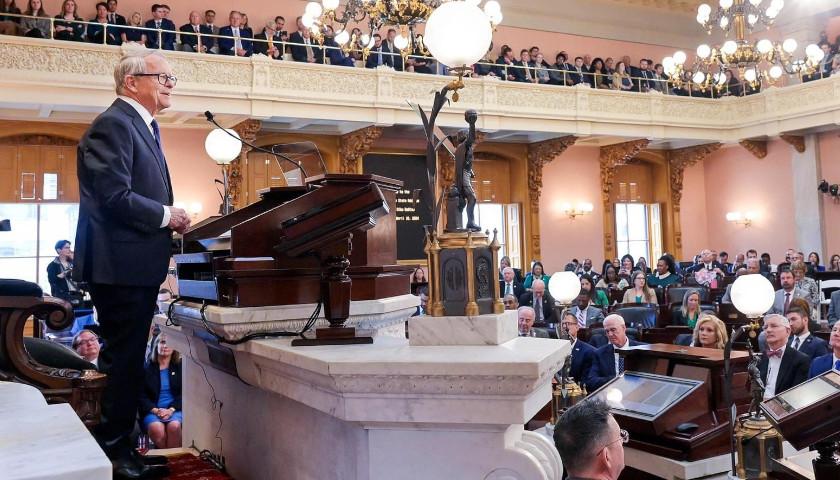Death-penalty abolitionists in Ohio this week are organizing a campaign to persuade lawmakers to end capital punishment in their State.
The nonprofit No Death Penalty Ohio is hosting letter-writing parties in various cities throughout the week in support of a state House bill and an identical state Senate bill to ban executions. While Republicans often support capital punishment and control both legislative chambers, the bills have some GOP support. State Senator Stephen Huffman (R-Dayton) is cosponsoring the Senate measure alongside Senator Nickie Antonio (D-Lakewood) while Representative Jean Schmidt (R-Loveland) is spearheading the House legislation with Representative Adam Miller (D-Columbus).
Currently, 134 Ohio prisoners now await executions, though the practice has become less frequent in the Buckeye State. In 2018, Governor John Kasich (R) put Robert Van Hook to death for the 1985 murder of David Self in Cincinnati, making hook the last person to receive the lethal injection in Ohio. Since taking over for Kasich in January 2019, Governor Mike DeWine (R) has not overseen any executions.
He attributed the change in policy partly to a federal court ruling questioning the humaneness of lethal injections and party to drugmakers’ refusal to supply the state Department of Rehabilitation and Correction with substances needed to perform them. Once a strong supporter of capital punishment, the governor said last year that his perspective on the issue “has certainly evolved.” Death-penalty opponents now see a possibility the General Assembly could send the DeWine the abolition bill and get his approval, perhaps before the legislative wraps up next month.
“I’m very optimistic,” Allison Cohen, interim executive director of Ohioans to Stop Executions, told The Ohio Star. “Ending the death penalty is a bipartisan issue and it’s something that conservatives readily support. When I talk to our Republican lawmakers, they’re concerned about how expensive it is, they’re concerned about the enormous government overreach that is occurring when we’re asking the government to take somebody’s life and for many of them it’s a pro-life issue; many of them are very consistent with their pro-life ethics and they believe that we need to respect life from womb to tomb and it’s as simple as that.”
Cohen says death sentences cost the state too much money, risk killing the wrongly convicted and unduly traumatize the victims’ families by essentially forcing them to follow convicts’ appeals processes that can go on for many years.
“Every single year or so, give or take, that murderer’s face is splashed all over the news [and] there’s a great deal of uncertainty around the appeals process,” she said. “Sometimes the decision is reversed and then it’s reversed again and it’s this back-and-forth, back-and-forth. And the entire time, the families are languishing in this uncertainty; their wounds are reopened again and again.”
Many proponents of capital punishment argue that it is not only just but has deterrent value beyond that of long-term or life imprisonment. Economist John Lott, who heads the Crime Prevention Research Center, notes the eagerness with which murder defendants often seek protracted jail terms rather than death. He cited Charleston, S.C. church shooter Dylann Roof who pleaded guilty and received nine consecutive life sentences in exchange for avoiding the death penalty. He also mentioned the strenuous and successful effort that Parkland, FL school shooter Nikolas Cruz and his attorneys made to secure life imprisonment rather than execution.
“If they didn’t want to avoid the death penalty, why are they fighting it?” he said. “Why do prosecutors all the time use plea bargains with the death penalty there?”
Lott also disputes suggestions that the death penalty is unduly expensive, observing that costs are reduced when prosecutors need not pursue a long trial because they instead reached a plea deal with a defendant hoping to avoid a death sentence.
“It’s true that there are lots of appeals and its true that death-penalty cases are costly, but first-degree murder cases are costly too,” he said. “And what often happens if you have the death penalty on the table is you can make a plea agreement.”
– – –
Bradley Vasoli is managing editor of The Ohio Star. Follow Brad on Twitter at @BVasoli. Email tips to [email protected].
Photo “Steve Huffman” by Ohio State Senator Steve Huffman. Photo “Nickie Antonio” by Nickie J. Antonio. Photo “Jean Schmidt” by Ohio House of Representatives. Photo “Adam Miller” by Adam Miller. Background Photo “Ohio Statehouse” by Ɱ. CC BY-SA 4.0.








